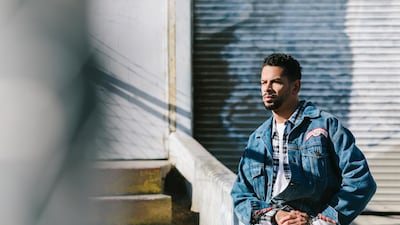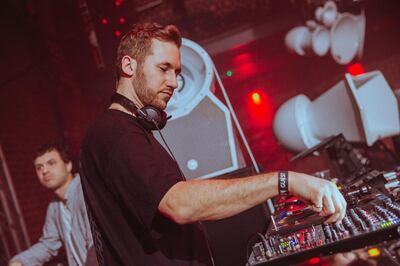There is no denying that the coronavirus pandemic has decimated the dance music industry. With all gigs cancelled and large open-air festivals not taking place for the foreseeable future, all sectors of the music industry have been affected, exposing a controversial revenue model which relies heavily on touring.
While the wealthy superstars of the genre may not be too financially impacted by the crisis, the deep freeze that the industry is going through is certainly affecting the gigging international DJ. They are the ones who appear on the bottom half of the poster. They are the ones with small teams. They are the ones who need the constant income of gigs to pay their mortgages.
The National spoke to four artists on that register to see how they are coping with the present shutdown. They present a range of opinions, some of which are optimistic while others share concerns about ways to carry their career forwards.
'It is time for a break': Lazare Hoche
For the French-Lebanese track-spinner, the coronavirus has been a great leveller. This time last year, he was in the midst of a 100-date world tour that included two jaunts to Australia, as well as playing at a few clubs in Ibiza. Speaking to The National from a locked-down Paris, Hoche says the experience should act as a wake-up call to both artists and fans enamoured by the glitz and glamour of the dance music world.
“A big part of that problem is social media and the way some artists use that to portray themselves in a certain way. Well, that has been removed now because we are all at home,” Hoche says.
“The industry projects this image that we are always on holiday, we are always wearing the best clothes, eating the best food and going to the best places. Now all of us, not just DJs, are focusing on what matters, which is our health and the health of our families, friends and society.”
This is something that Hoche has been reflecting on more than most. As someone who built his career in the French underground scene, he is used to sudden and prolonged cancellations on the back of crisis.
“In France, we had terrorist attacks and so many strikes, from the taxis to the metro, so having shows cancelled is something that I have experienced many times before,” he says. “When things like that happen, the first sector to suffer is live entertainment and what is happening now is no different.”
Without a clear idea of when the live music industry will return after the pandemic abates, Hoche says many artists and clubs will struggle financially in the months ahead, as they try to find ways to make ends meet. At the same time, the enforced break may be just what everyone needs to repair physically from the grind of touring.
Make no mistake, Hoche states, if you are a working class DJ, then life on the road is no picnic. “It is a rat race and somehow, we all got in this mentality in trying to find ways to do the most countries in a month. That’s planes, trains, cars and no sleep,” he says.
“A normal human is not made to play nine countries a month, even with a great income. This shows how this live music model in the dance industry is weird. Maybe with what is happening now, it is time to change it.”
'It is terrifying, given that I have a mortgage to pay': Archie Hamilton
The London DJ and producer should have been mid-tour in North America, promoting his acclaimed debut album Archive Fiction, but he's at home instead. Hamilton says the cancelled gigs have dealt him a heavy financial blow.
“I’ve had my US tour cut short and all of my gigs for the foreseeable future, which is frankly terrifying given the fact that I have a mortgage and bills to pay,” he says. “And I have a team who I work with, and very sadly, there is literally no money to pay them, so that puts me in a very difficult position.
"What I’m trying to do is come up with any other means, positive means, creative means, that are revenue producing. I’ve started looking at doing engineering sessions with people, mixing for people and anything else … I’m still thinking of ideas.”
The whole situation has been eye-opening, Hamilton says, as it exposes just how frail the dance music industry is at present. With revenue from streaming services paltry, gigging constantly is the only way to make ends meet.
“All it takes is a month or six weeks of no shows, and most people are facing bankruptcy,” he says. “I absolutely don’t think that the current model of online music consumption is fair at all to the artist. I know I’m banging my head against a brick wall saying this, but artists should be fairly paid for their music and they are not at the moment. This is what forces people to tour heavily.”
As well as the mental and physical strain such a career presents, Hamilton says this approach results in subpar tunes. “If you look back to the 1990s where you’d sell 5,000 or 6,000 records quite easily, that enables the artist to invest in their studio,” he says.
“Even if you’re not a naturally talented, gifted or an experienced producer, that income enables you to invest in your studio and perhaps hire an engineer to work with. This is why the quality of the music back then is better than it is now.”
'It is time for artists to renew their intentions': Rebecca & Fiona
Maybe the enforced break is a good thing, according to Rebecca Scheja, one half of Swedish dance-music duo Rebecca & Fiona. Ever since they burst on to the scene in 2010 with Luminary Ones, the duo have been a constant fixture on the road, including a performance in the UAE at the DXB Music Festival in 2012.
Scheja believes artists should use the time off to “update” their intentions and ask themselves if they are making music for the art or the commerce.
“To be honest, I believe that the scene has been so over-consumed in so many ways, over the past couple of years,” she says. “We all need a break, to reinvest and renew ourselves and appreciate everything again.”
Her partner on the decks, Fiona Fitzpatrick, expects better music to emerge after this lockdown, simply because DJs have more time on their hands.
“People have time to actually listen to other people’s music,” she says. “Then they may get inspired to do more cool collaborations.”
'The industry needs a new formula': MK
Veteran Detroit DJ and producer MK, known for classic deep house tracks Always and Love Changes, says he is spending his time away from the road creating new tunes.
MK, real name Marc Kinchen, explains that it is the only way to process such a life-changing event. “Honestly, as a part of the scene or as a human being living on this planet, I can’t think of anything to measure a disaster of this scope in our lifetime,” he says. “I have nothing to compare this tragic situation with.”
Fortunately, as a respected producer and performer, he is confident he won’t run out of gigs once the scene is back up and running. However, he admits that his re-entry to the live music circuit will come with some misgivings on how the industry is managed.
Covid-19, he says, has exposed the EDM industry’s over-reliance on live music as a major revenue source. MK hopes the pandemic could kick-start much-needed discussions with online music platforms with a view of artists getting a more equitable share of streaming revenue.
“The whole thing has shown how disproportionate live income is in comparison, for instance, with streaming income. I think someone needs to look at that formula again and see how artists can participate and share more in the income generated by streaming,” he says. “This virus is doing damage to us all, inside and out of the industry.”
Until then, he is content being at home to rejuvenate physically and mentally. “As horrible as it is, this unwelcome and unexpected break has turned into an opportunity for me to have a bit of a reset,” MK says.
“I am taking this time to recharge not only my body and my mind, but also my creative instincts. Not working to a deadline can really be a great way to feel free and inspired again.”




